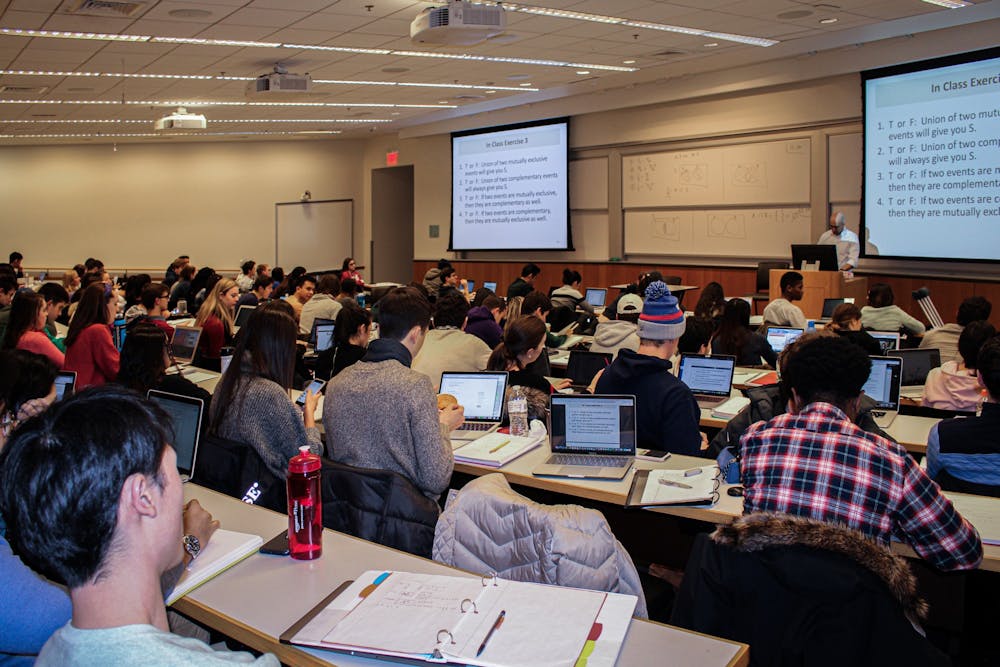
A Wharton class being conducted on Feb. 13, 2019. Some Wharton classes will continue to include online instruction for the spring 2022 semester.
Credit: Miranda GongMost undergraduate courses next semester will be taught in person, although some Wharton School courses will include online instruction in the spring.
The University's emphasis on in-person instruction for spring 2022 applies to all four undergraduate schools, according to an email to The Daily Pennsylvanian from Associate Vice Provost for Education and Academic Planning Gary Purpura. While most courses this semester were taught in the classroom, many still included hybrid and virtual components.
“In some extremely rare cases, an undergraduate course may be offered online during spring 2022, but even in those cases, we will strive for in-person activities for the course (in-person office hours, for instance, or in-person recitation sections if the lecture component is online),” Purpura wrote.
Courses being taught virtually next semester include STAT 435: "Forecasting Methods for Management," which will be fully online, and STAT111: "Introductory Statistics," which will offer recorded lectures with in-person recitations and exams. The decision to incorporate online elements into these courses was not related to COVID-19, Senior Vice Dean of Teaching and Learning at Wharton Brian Bushee clarified in an email to the DP.
Bushee wrote that STAT 435 was approved to be online in March 2021 by the Wharton Dean’s Office, and that the decision was not related to COVID-19. The course, which is cross-listed as a graduate course with 70% of the class comprising graduate students, will not be offered online to undergraduates after spring 2022, Bushee wrote.
Meanwhile, STAT 111 was not considered an "online" course by Wharton due to it having significant in-person components, Bushee wrote.
“The Wharton Dean’s Office approved this structure in May 2021 so we could free up our large lecture hall for other large courses to meet student demand. This course was also included in the Provost’s Office approval process in August 2021,” he wrote.
After next semester, undergraduate Wharton courses will no longer be offered online and only graduate courses will be considered for approval by the Wharton Dean’s Office, Bushee wrote.
Multiple courses were mistakenly listed as “online” in Penn InTouch earlier this month due to a coding error, which has since been resolved.
“Some of the coding attached to our spring 2021 courses — i.e. the coding indicating courses were to be held 'online' — was simply never removed when the spring [2022] courses were rostered,” Associate Director of Undergraduate Studies Yvonne Fabella wrote in an email.
Wharton courses MGMT 101: "Introduction To Management," MGMT 267: "Entrepreneurship and Technological Innovation," and BEPP 208: "Housing Markets" were listed as online but are actually slated to be in person in the spring.
“I have really enjoyed being back in the classroom for the Q2 fall section of MGMT 267, and I am looking forward to staying there,” Wharton professor Jacqueline Kirtley wrote in an email.
Some College of Arts and Sciences courses were also mistakenly listed to be online. HIST 027: "Ancient Rome," BIOL 109: "Introduction to Brain and Behavior," and AFRC 168: "History of American Law to 1877" were just a few of the several courses entered as having online components.
College Dean Paul Sniegowski clarified the online listings were just an error, writing in an email that the College is "emphasizing in-person instruction for the spring, as it did for this fall."
The move to return fully to in-person teaching reflects the University's confidence in its handling of the pandemic during campus' reopening this fall.
“We as the Penn community have been very successful this semester," Chief Wellness Officer Benoit Dubé said. "We have seen no COVID-19 cases due to classroom transmission, and that is continued proof that our multilayered mitigation strategies — vaccines, testing, and masking — are working to protect the community and achieve our educational mission.”
The Daily Pennsylvanian is an independent, student-run newspaper. Please consider making a donation to support the coverage that shapes the University. Your generosity ensures a future of strong journalism at Penn.
Donate







